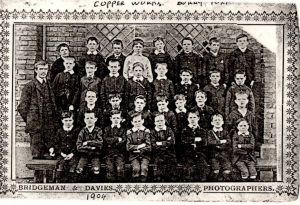
THE COPPERWORKS SCHOOL LOG BOOKS
Built by Elkington and Mason, owners of the Pembrey Copper Works, the school was opened in 1855 by Josiah Mason and was one of the many schools built in the 18th and 19th centuries for children of industrial workers. It was well staffed and the buildings were, relatively speaking, in good condition although cramped. Most of the headteachers were certificated and pupil teachers and monitors trained. It no doubt also received grants from other patrons and societies (although it was non-denominational) and in addition a “poundage” educational tax was levied on the teachers in the first few decades of its existence. Although at first they were exempt, children of the Copper Works employees paid the school pence (2d for boys and girls and 1d for infants) until 1891.
The log books of the school are, at the time of writing, temporarily stored in the Glamorgan Archives, Cardiff. We were able to examine entries for the boys, girls and infant schools. The handwriting, normally that of the headteacher, in some of the early entries was quite difficult to read and sometimes illegible. The log of the boys’ school was much fuller in content. In 1872 a new code of regulations demanded that the Principal Teacher must at least once a week enter a statement of progress, withdrawals, commencements, illness, cautions. Inspectors will inspect the log book at every visit.
We have not conducted a systematic research of the log books (not all were available) but after a day’s reading the following information was extracted.
Below are some of the main features of the Boys and Girls schools:
- There were daily comments on attendance and progress. Generally attendance was poor. One statement in October 1878 suggested that almost half of the whole school – 229 children – had been too irregular in their attendance to be examined. The bad weather and Llanelly market were crucial factors in attendance
- There was also considerable absenteeism by teachers.
- Registers were examined regularly. In one entry the headteacher complains that a senior teacher was very careless and forgetful and did not mark the register until 2.30.
- The schools were inspected at least once a year and the headteacher would write a summary and make it available to managers and board members. The amount of the grant awarded by the company as a result of the inspection was entered at the end of the report.
- The girls generally received more complimentary reports than the boys but these varied from year to year. A typical comment: “The girls are bright and clean and under fair discipline….the reading in the higher standards was very creditable….”; “the arithmetic merits special praise”; “grammar was weak especially in the higher standards”. However, standards were noticed to fall at one point with a change in the teacher.
- Standards in the boys’ school were generally good but the school received more negative comments than the girls. For example: “greater attention should be paid to the handwriting and spelling in the higher standards”; “arithmetic of the older boys was weak”;
- Teaching was often described in very favourable terms – e.g. “vigorous and intelligent”.
- Speaking Welsh was frowned upon – “Welsh is so much spoken in this school that the children can scarcely comprehend what is said to them”.
- The Elkingtons were regular visitors to the school – especially Howard
- Pupil teachers were examined in much the same way as the children in reading writing and arithmetic. One is spoken of in scathing manner – “20 minutes late today”; “very careless about his duties”; “homework no half done”; “is useless as a teacher”.
- There were examples of dubious behaviour in the boys’ school: “….the unlawful possession of two shillings…. sentenced each of the above boys to a stroke with the cane on each hand….”.
- There was payment by results. On one occasion the payment of a grant was threatened “unless a more favourable report is received from HMI as to attainment and general efficiency”.
- Teaching spaces were crowded: a teacher complained that “the class was large and I had to contend with the usual difficulty of making myself heard in a crowded room with the other classes at full work”.
The infant log book started in 1876 and here are some of the key features:
- There were health issues. Diet, poor housing and sanitation meant that children were at this time were under constant threat from the killer diseases of cholera, measles and scarlet fever. The Log Book of October 1870 and January 1871 reports the death of children from measles and scarlet fever
- The dentist regularly visited the school to inspect teeth. It does not say what treatment was given for rotten teeth!
- The Elkington family, particularly Howard and Gerard Elkington, as part founders and sponsors of the school took a great interest in what went on there and were frequent visitors. A log entry of 16th February 1876 states that Howard Elkington looked at the children’s copy books from class 1 and the children sang him a song “The Last Rose of Summer”, which they had learnt.
- An explosion had taken place in the colliery and on 3rd November 1877 the Log states that Rev Watkins from Tabernacle Baptist Chapel came to talk about it with the children who were then given a half day holiday on account of the funerals being held that day.
- There were frequent closures and poor attendance during bad weather, snow, extreme cold, or storms. This also included closures for very hot days. A HMI Report dated 1898 states that “a door should be fitted to stop the rain and cold blowing into the classroom occupied by the younger infants”.
- The children attended many of the music and singing festivals held in the chapels, for which they were given holidays. In 1887, for example, there were festivals at the Welsh Congregational Chapel, Tabernacle Baptist Chapel and at Jerusalem.
- On April 7th 1887 there was a half day holiday for Pembrey Fair. There were also unofficial holidays as often recorded in the Log such as market days in Llanelli when attendance was very poor and when in October 1891 help was needed for potato digging. But on July 13th 1903 the whole school was given an official half day holiday when Buffalo Bill came to Llanelli.
- HMI Inspections. As with the Girl’s and Boy’s Schools the Infant School was regularly inspected. Much attention was given to discipline and a phrase quoted in the 1882 inspection “This department is under fair discipline “ was often used and seems in today’s parlance “satisfactory”. It was also important that the children should come to school “clean and tidy” and be regular in attendance. The HMI Report of 1901 tells us that the lessons were too long and that a piano was needed for the younger children. Inspectors also commented that the class was too big.
Overall the verdict on the Copper Works Infant School was a positive one. On the whole the children were well “instructed” and the school buildings for their time were good and the school was well resourced. There were a few qualified teachers at the school and there was provision for assistant teachers and pupil teachers to have further training.
Graham and Ellen Davies January
